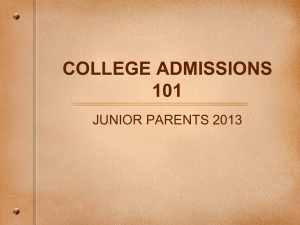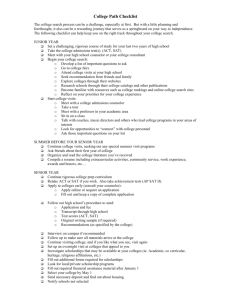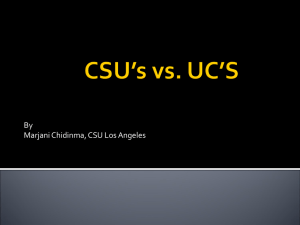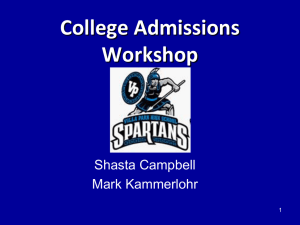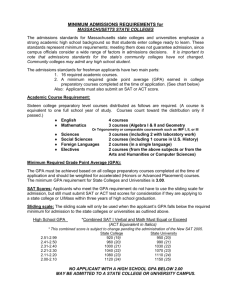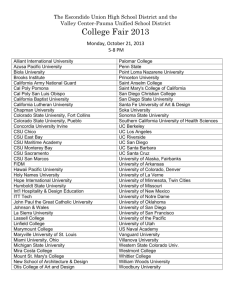Social Science - Conejo Valley Unified School District
advertisement
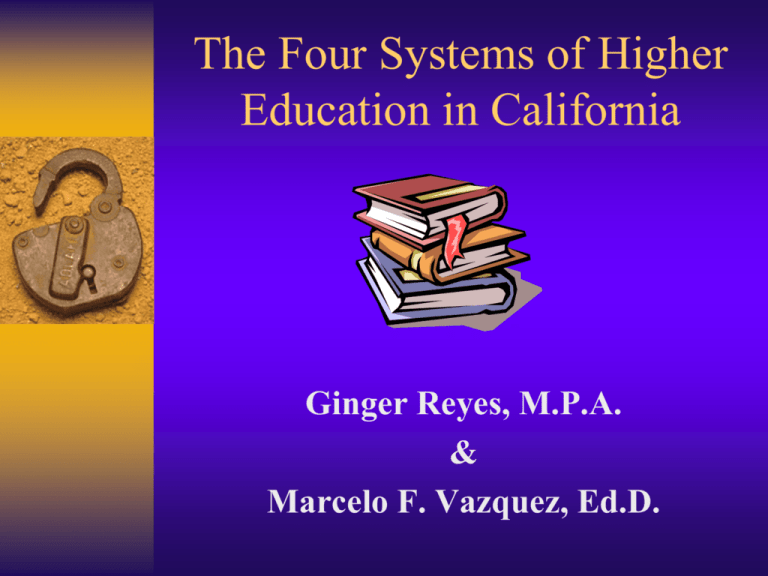
The Four Systems of Higher Education in California Ginger Reyes, M.P.A. & Marcelo F. Vazquez, Ed.D. How do/did you choose YOUR college? 2011 U.S. News & World Report Collegiate Rankings Harvard 2. Princeton 3. Yale 4. Columbia 5. Stanford 6. University of Pennsylvania 7. Cal Tech 8. MIT 9. Dartmouth 9. Duke 1. California Master Plan University of California (UC) 12.5% California State University (CSU) 33% Community College (CCC) 100% Private Colleges & Universities Recommended Route High School Another Recommended Route “High School” The CSU System The CSU Mission Statement The mission of the California State University is: – To advance and extend knowledge, learning, and culture, especially throughout California. – To provide opportunities for individuals to develop intellectually, personally, and professionally. – To prepare significant numbers of educated, responsible people to contribute to California's schools, economy, culture, and future. – To encourage and provide access to an excellent education to all who are prepared for and wish to participate in collegiate study. – To offer undergraduate and graduate instruction leading to bachelor's and higher degrees in the liberal arts and sciences, the applied fields, and the professions, including the doctoral degree when authorized. – To prepare students for an international, multi-cultural society. – To provide public services that enrich the university and its communities. CSU Campuses Different Sizes, SAME Mission Same Admissions Requirements Yet VERY Different Standards. Somewhat Different Curricula Usually best to check with intended school – Most websites include a link to email admissions Different “Flavors” Humboldt Channel Islands Cal Poly Pomona & SLO Long Beach, San Diego, Northridge Los Angeles What can I study at a CSU? Radio/Television Film San Francisco State Dance San Diego State Engineering - Theme Park CSU Long Beach Interior Design San Jose State Dairy Science Cal Poly San Luis Obispo Hotel Restaurant Management CSU Pomona Global Intelligence & National Security CSU Bakersfield Computer Gaming & Design CSU Channel Islands Fire Protection Administration Music Industry & Tech. CSU Los Angeles Chico State Freshmen Admissions Requirements The basic admissions requirements include: Specific high school courses Grades and test scores Graduation from high school College Preparatory Pattern a. U.S. History or U.S. History and 2 Years Government, and Social Science b. English 4 Years c. Mathematics (Algebra, Geometry, Algebra II) 3 Years d. Science with Lab 2 Years (CSU requires one Biological Science and one Physical Science) e. Language Other Than English 2 Years (two years of same language) f. Visual and Performing Arts 1 Year (A single yearlong approved course) g. Electives 1 Year _______________________________________________________ Comprehensive a-g pattern of college preparatory study15 Units Grade Point Average The high school GPA is based upon grades earned in all approved college preparatory courses taken in the 10th, 11th and 12th grade CSU will award honors points in the GPA calculation for up to 8 semester courses taken in 11th and 12th grade. No honors points are awarded for grades of D and F. Tests & Scores The CSU accepts the SAT I and ACT. CSU only looks at Critical Thinking and Math portion of SAT I If a student submits multiple score reports the highest score earned in each single sub score of the examination is used. Example: – 1st time: 500 M + 600 CR= 1100 – 2nd time: 550 M + 550 CR= 1100 – CSU total = 550 M + 600 CR= 1150 Eligibility Index GPA ACT SAT GPA ACT SAT 2.95 11 540 2.45 21 940 2.90 12 580 2.40 22 980 2.85 13 620 2.35 23 1020 2.80 14 660 2.30 24 1060 2.75 15 700 2.25 25 1100 2.70 16 740 2.20 26 1140 2.65 17 780 2.15 27 1180 2.60 18 820 2.10 28 1220 2.55 19 860 2.05 29 1260 2.50 20 900 2.00 30 1300 2012/13 Impacted for Freshman Admissions (16 campuses) Chico Fresno Fullerton Humboldt Long Beach Los Angeles Northridge Pomona • • • • • • • • Sacramento San Bernardino San Diego San Francisco San Jose San Luis Obispo San Marcos Sonoma 2012/13 Who is Not Impacted (7 campuses) • • • • • • • Bakersfield Channel Islands Dominguez Hills East Bay Maritime Academy Monterey Bay Stanislaus 2012/13 Impacted for Transfer Admissions Campus •Chico •East Bay •Fresno •Long Beach •Los Angeles •Pomona •Sacramento •San Bernardino •San Francisco •San Marcos •Sonoma Campus/Program (All Majors) San Diego San Luis Obispo Fullerton San Jose Most campuses have at least one impacted major (i.e. Nursing) Average Per Year College Costs Tuition $4,721 - $6,780 Books $1,800 per year Housing $7,114 - $15,936 Transportation $1,300 Personal $3,114 TOTAL $18,049 - $28,930 www.csumentor.edu Important Dates for Admissions Application Priority Filing Period: – Fall: October 1st - November 30th FAFSA-Free Application for Federal Student Aid for fall: – January 1st – March 2nd EOP-Educational Opportunity Program: – Varies Scholarships: – Varies The UC System UC Mission Statement The University’s fundamental missions are teaching, research and public service. UC Campuses Different Sizes, SAME Mission Same Admissions Requirements Yet Different Standards. Somewhat Different Curricula Usually best to check with intended school – Most websites include a link to email admissions Different “Flavors” UCSC UCLA UC Merced The UC Bachalaureate Experience Research – Social Sciences, humanities & Engineering, Business, Nursing, etc. – Faculty at forefront of respective fields – Teacher Assistants and Grad students may lead courses. General Education – Social sciences, humanities and Natural Sciences, and more – More interdisciplinary studies – Instruction usually in larger classrooms. How Do I Become Eligible for UC Admissions ? Paths to the University of California 1. Eligibility in the Local Context (ELC) 2. Statewide Context Eligibility in the Local Context School sends top 15% of 11th grade class ELC Office selects top 9% -Complete 11 units that include 1 unit of history/social science 3 units of English 2 units of mathematics 1 unit of laboratory science 1 unit of language other than English 3 units chosen from among the remaining “a-g” Students who do not complete at least 11 of the 15 “a-g” requirements will not be considered for ELC UC Eligibility Requirements A-G Subject Requirements Scholarship (GPA) Requirement Examination Requirements Extracurricular Activities Statewide Context UC Eligibility Requirements PATH TO UC A-G Subject Scholarship (GPA) Examinations Subjects to meet and exceed admission requirements for the UC and CSU systems A. History/Social Science Courses include US History, World History, Government, geography B. English/Composition and Literature Required Number of Years 9th 1st semest er 10th 2nd semester 2 Required 3 Recommended* 4 Required 11th 12th 1st semester 2nd semester 1st semester 2nd semester 1st semester 2nd semester World History World History US History (AP) US History (AP) Govt* (AP) Economics * (AP) English 9 English 9 English 10 English 10 English 11 (H/AP) 11(H/AP) 12(H/AP) English English 12 (H) (H) (H) (H) English (H/AP) C. 3 Required 4 Recommended* Algebr aI or Geome try Algebra I or Geometry Geometry or Algebra II Geometry or Algebra II Algebra II or Math Analysis Algebra II or Math Analysis Math Analysis or Calculus * Math Analysis or Calculus* D. 2 Required 3-4 Recommended* Biology Biology Chemistry (H/AP) Chemistry (H/AP) Physics* (H/AP) Physics* (H/AP) AP Biology* (H/AP) AP Biology* (H/AP) E. 2 Required 3-4 Recommended* Languag e Other Than English I Language Other Than English II Language Other Than English II Language Other Than English III* Language Other Than English III* Language Other Than English IV* (AP) Language Other Than English IV* (AP) F. 1 Required G. College Preparatory 1 Required Mathematics includes Algebra I, Geometry and Algebra II. Advanced Courses like Trigonometry and Calculus are also recommended. Laboratory Science Includes biology, chemistry and physics & integrated/inter- coordinated science Language Other Than English Includes Spanish, French, German, Japanese, Chinese and Russian, etc. Visual and Performing Arts (drama, orchestra, photography, etc) Language Other Than English I Drama A Drama B Electives Exams PSAT/ACT/ SAT Reasoning SAT (Subject Tests) Required Exams PSAT (October) PSAT (October) SAT (Feb) SAT (Subject tests) (June) PSAT (October) SAT (Dec) SAT (Subject Tests) May/ June SAT (Oct/Nov/ or Dec.) SAT Subject Tests High School Courses Advanced Placement *College Level Honors Any identified H/AP/CL courses taken between 10th - 12th Grade receive an 1+ extra GPA point when passed with a grade of “C” or better. Regular * College Level courses are offered to High School students at local Community Colleges through Concurrent Enrollment. Exams PSAT (Preliminary Exam- Shorter Version of SAT) - Critical Reasoning - Math - Writing ACT - Reading Comprehension - Math - Social Science - Science Reasoning PLUS - Writing SAT - Critical Reading - Math - Writing SAT Subject Exams No longer required, but highly recommended for Engineering applicants. 2 Subjects from Math II, Biology, Chemistry, and Physics. Page #3 from the UC Application SEQUENTIAL COURSES MATHEMATICS LANGUAGE OTHER THAN ENGLISH The Personal Statement: Freshman Applicants Question # 1 1. Describe the world you come from – for example, your family, community or school – and tell us how your world has shaped your dreams and aspirations. The Personal Statement: Freshman Applicants Question #2 Focus: Open-ended 2. Tell us about a personal quality, talent, accomplishment, contribution or experience that is important to you. What about this quality or accomplishment makes you proud and how does it relate to the person you are? UC Cost for CA Residents Living on campus Living off campus Tuition & Fees $13,200 $13,200 Books & Supplies $1,500 $1,500 Health Insurance fee $1,160 $1,160 Room & Board $13,200 $13,200 Personal Transportation $2,140 $3,040 TOTAL $31,200 $32,100 Which two UC campuses have undergraduate business administration programs? UC Berkeley & UC Riverside California Community Colleges California Community Colleges 72 districts – 112 colleges – enrolls more than 2.9 million students. Provide: – basic skills education – workforce training – and courses for transfer to four-year universities. – personal enrichment and lifelong learning. Students must be 18years of age or H.S. Graduates – Diploma necessary for financial aid Instructors must meet state set requirements – Master’s degree &/or years of experience California Community Colleges Basic Education – ESL – Courses for High School Diploma Work Force Training – Technical training for a specific job/career – Auto mechanics, Cosmetology, X-Ray Tech, Nurse’s assistant, Nurse, Firefighting, etc. – Classes are usually non-transferrable – Culminate in Certificate California Community Colleges Courses for transfer – Intersegmental General Education Transfer Curriculum (IGETC) – College level courses – Designed to take 2-3 years – Private schools may take 1 year Courses for lifelong learning – Art, counseling, personal financing, etc. – Non-traditional & returning students East Los Angeles College Part of the Los Angeles Community College District Requires placement tests for math and English Traditional college resources: Computer lab, book store, student center, etc. Non-residential= No Dorms Student organizations, clubs, and support programs Two transfer students apply to UC Berkeley. One of the applicants is from Pierce College and the other from UCLA. Which student is considered first? The Pierce College Student The California Independents “As a group, independent colleges and universities provide diversity in size, location, types of students served, and many other ways. They emphasize teaching and learning, and focus on the individual student.” AICCU Private & Independent Colleges Different Sizes & Missions Different Admissions Requirements Different Deadlines Different Curricula DIFFERNT EVERYTHING!!!! Usually best to check with intended school – Most websites include a link to email admissions Different Sizes: Small vs. Large Large Small Larger classes Can be more Greater competition competitive to get in Less competition for courses and clubs Get to know professors & staff Can be isolating Everyone Knows your business for courses and activities Greater resources and more programs Can be anonymous Slip through cracks Different Missions: Research vs. Liberal Arts Research – Social Sciences, humanities & Engineering, Business, Nursing, etc. – Graduate/Doctoral Programs – Faculty at forefront of respective fields – Teacher Assistants and Grad students may lead courses. – Many NCAA I Liberal Arts – Focus on social sciences, humanities and Natural Sciences – Usually Undergrad only – Many general education requirements – More interdisciplinary studies – Focus on instruction – Less of a sports emphasis: NCAA III Different Admissions Requirements High School GPA & Courses Tests: SAT Reasoning, SAT Subjects, ACT – Bates vs. Georgetown Extra Curricular Activities Personal Statements-many have multiple Awards & Honor Letters of Rec. Other: Reading lists, church hours, Legacies, etc. Financial Need: Need Blind v. Need Aware Different Deadlines Early Decision & Early Action The Common Application Mid Year Report CSS Profile Different Curricula Rhode Island School Of Design-Area Specific Antioch College-Work Co-Op Scripps College-All Women's College Colorado College-Block Schedule Columbia-Core requirements Independent University/College Cost Living on campus Living off campus Tuition & Fees $20-40,000 $20-40,000 Books & Supplies $1,500 $1,500 Room & Board $12-16,000 $12-16,000 Personal Transportation $2,000 $3,000 TOTAL $35-59,000 $36-60,000 Which U.S. university has the highest number of international students on their campus in the United States? Answer: The University of Southern California (USC) 8,615 Source: Institute of International Education, Open Doors Report (2011) Admissions Deadlines/Timelines CSU application: Submit between October 1 - November 30. www.csumentor.edu UC Application: Submitted between November 1 – 30. www.universityofcalifornia.edu/admissions/ Independent Application: Range between Fall and early Spring. www.commonapp.org Admission & Financial Aid Tips: Find a campus that best fits you and take a campus tour! Apply early Check your email (The email address that is on your application is the one we email to) Go to a Financial Aid Workshop with your parents Remember that when you are admitted it is provisional (you have to complete your last semester of high school and still meet the admissions requirements)! Do not assume the admissions process is the same for all colleges and universities. Pay attention to communication that is sent to you via email and mail. Q. How do I ease the anxiety for my student & I during college admissions? College Preparation starts yesterday. Strive for good grades, leadership and community service to be able to have options when applying, this includes scholarships. Take campus tours. Help your student figure out what he/she likes/dislike Organization. Start creating file folders of places you have visited. Begin to narrow campuses down. Attended College Fairs – NACAC Fair- May 1st Ventura County – NACAC Fair- April 30/May 1st Pasadena Conv. Center The Four Systems of Higher Education in California Ginger Reyes, M.P.A. & Marcelo F. Vazquez, Ed.D.
